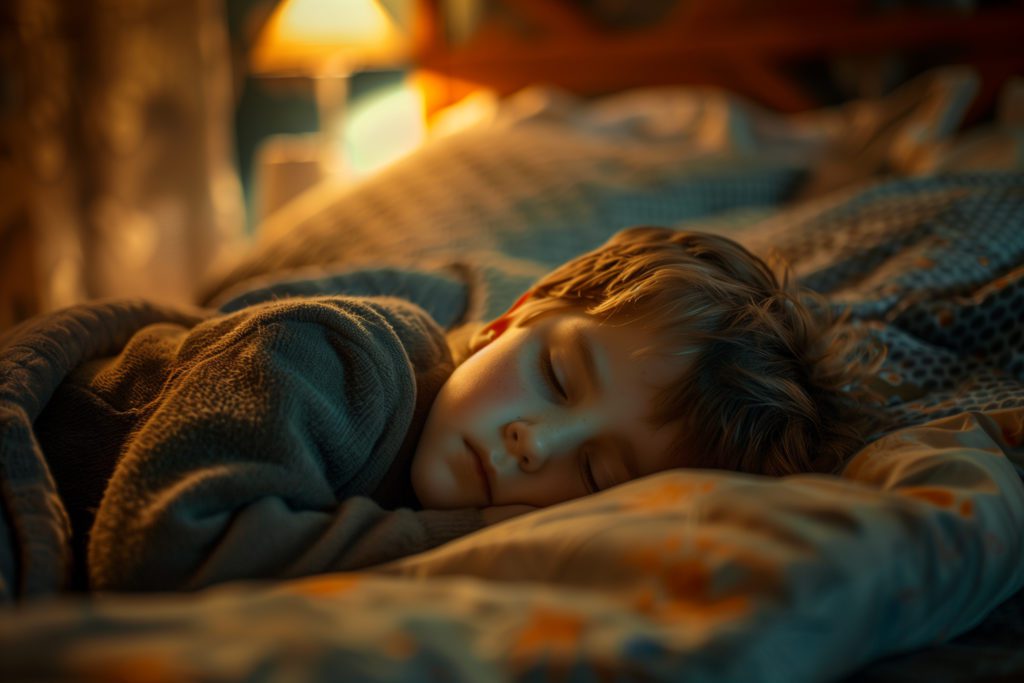
How to Support Your Child Through Bedwetting Challenges
Bedwetting can be difficult for kids and parents. It’s important to be patient, cut out nighttime drinks, and remind them to use the bathroom before bed.

Is your child still wetting the bed even though they are in school? Are soggy pajamas and sheets an everyday occurrence at your home? Bedwetting can be embarrassing for kids and frustrating for parents. After all, it’s no fun changing sheets in the middle of the night — once again. Both children and parents can lose sleep over this issue. However, it’s important not to get upset if your child wets the bed, as that can make things worse. We’ve put together some tips to help you deal with this challenge.
What is Bedwetting?
Bedwetting (also known as nocturnal enuresis), is defined as involuntary urination in children over the age of five while asleep. It can be a common occurrence in childhood — about 15 percent of children still wet the bed at age five. However, most kids naturally outgrow bedwetting by the age of 12.
There are two types of bedwetting: primary occurs when a child hasn’t ever had bladder control at night, and secondary enuresis is when a child starts bedwetting at least six months after they have learned to control their bladder.
What Causes Bedwetting?
In many cases, bedwetting is caused by genetic factors. If one biological parent wet the bed after the age of five, there is a 25 percent chance their child will wet the bed too. If both biological parents wet the bed, that percentage increases to 65 percent.
When a child starts to experience bed-wetting after the age of five, it’s a good idea to have them checked out by their pediatrician to rule out medical causes. Medical problems that can cause bedwetting include:
- Urinary tract infections (UTIs) - These infections can lead to incontinence at night both in children and adults. Symptoms include pain when passing urine and frequent urination.
- Diabetes - One of the symptoms of type 1 diabetes is bedwetting, especially in children who previously did not wet the bed. Other symptoms include excessive thirst and hunger, blurry vision, and unexplained weight loss.
- Constipation - If a child is constipated, stool may push on the bladder causing it to empty during the day, as well as at night.
- Sleep apnea - Bedwetting is associated with sleep apnea in children.
- Small bladder - Some children have small bladders that can’t hold very much urine.
- Hormone imbalance - Some kids don’t produce enough of the antidiuretic hormone (ADH) vasopressin. This hormone is responsible for slowing down the production of urine during the night.
- Stress and anxiety - Stressful events, such as parental divorce or bullying, can lead to persistent bedwetting.
- Attention deficit hyperactivity disorder (ADHD) - Children who are diagnosed with ADHD are almost three times as likely to experience bedwetting compared to other children.
How Bedwetting Impacts Sleep
As you can probably imagine, bedwetting leads to disturbed sleep. Studies indicate that children who wet the bed at night have much more fragmented sleep compared to peers who don’t wet the bed. They also suffer from excessive daytime sleepiness. This is likely because wetting the bed causes the child to wake up. It’s then hard for them to go back to sleep.
Tips for Supporting Your Child With Bedwetting Issues
Bedwetting doesn’t have to ruin your or your child’s nighttime. Here are some tips for getting this issue under control.
Do’s
- Be patient - Most kids will outgrow bedwetting. Being patient is difficult, but it is often the best choice for dealing with this issue. Be supportive and remind your child that they will outgrow this problem in time.
- Cut out drinks before bed - Eliminate drinks an hour before bedtime, including water and milk, as fluid intake can play a role in wetting the bed.
- Change their bedtime routine - Establish a relaxing bedtime routine for your child. A calming bedtime routine is good, in general, for children to help them get a good night’s rest. But, it can be especially helpful if your child struggles with anxiety that might be triggering bedwetting.
- Encourage them to go to the bathroom before bed. Before bed, encourage your child to go to the bathroom. You can even ask them to go multiple times leading up to bedtime. Remind your child to relax and let out all of their urine.
- Get your child on a predictable bedtime schedule - Following a regular bedtime schedule can help anyone who struggles with bedwetting. It helps train your child to empty their bladder at appropriate times.
- Reconsider your child’s beverages - Cut out drinks that have caffeine like soda and hot chocolate. These can act as a diuretic and cause bedwetting. Caffeine can also interfere with your child’s sleep. Stick to water and milk instead.
- Have your child help in the clean-up process - Reassure your child that you want to help them with this issue but have them take responsibility for helping you with the clean-up.
- Use waterproof bed covers - To make clean-up easy, use a good set of waterproof sheets and mattress covers. Also, make use of room deodorizers.
Don'ts
Bedwetting can be quite embarrassing for kids and erode their self-esteem. They may be embarrassed to sleep over at friends' houses or attend overnight camps. Here are some ways that parents can help.
- Avoid punishing or blaming your child - Bedwetting isn’t from laziness. It’s beyond your child’s control. Punishing or blaming them for it will just cause anxiety and make the problem much worse.
- Don’t embarrass or tease your child - And, don’t allow others in the family to tease them either. Don’t talk about their bedwetting with siblings or others in the family.
- Don’t restrict fluids throughout the day - Sometimes parents will take things too far and restrict fluids during the day. Limiting fluids right before bed is fine, but there’s no reason to restrict fluids excessively. It isn’t healthy and won’t reduce bedwetting.
We can all agree that bedwetting can be stressful for both the child wetting the bed and the parents, as well. Fortunately, following the tips above can help you better support your child and may help reduce bedwetting. But, if not, it’s a good idea to visit their pediatrician for an evaluation.

Written by
Emily Mendez
Emily Mendez is a former therapist and mental health author. She is one of the leading voices in mental health. Emily's writing has appeared in eCounseling, SonderMind, and more. Emily is frequently interviewed by Healthline, Fatherly, INSIDER, Family Circle, and other national media for her advice and expert opinion on the latest mental health topics.
Download Pillow
Get help
Press & News
Legal
Connect
X (Twitter)
Company
Copyright © Neybox Digital Ltd.



